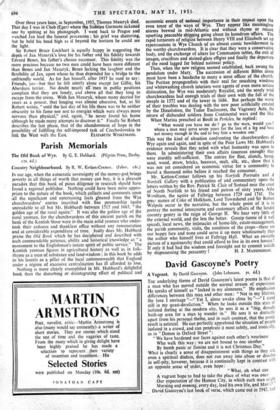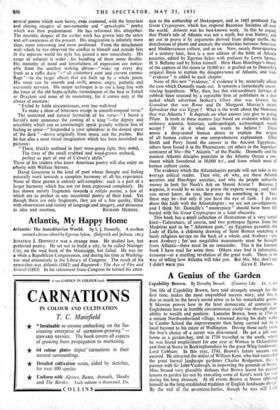David Gascoyne's Poetry
A Vagrant. By David Gascoyne. (John Lehmann. as. 6d.) THE underlying theme of David Gascoyne's latest poems is that of a man who has moved outside the normal stream of experience. He speaks of himself as "locked in my aloneness." He emphasises differences between this man and other men: "Not in my lifetime, the love I envisage "—" Yet I, alone awake close by "—" I stand still in my quasi-dereliction." When he looks outside this state of isolated feeling at the modern city, he sees it as a "big, densely built-up area for a man to wander in." He sees it so distinctly apart from his personal therm, and in such contrast, that the poetic result is satirical. He can perfectly apprehend the situation of people isolated in a crowd, and can penetrate it most subtly, and ironically, as in "Demos in Oxford Street ":
"We have hardened our faces against each other's weariness Who walk this way ; we are not bound to one another By bomb panic or famine and it is not Christmas Day." What is clearly a sense of disappointment with things as they are. even a spiritual disdain, does not run away into abuse or dissolve in self-pity, however, because it is continually kept in contrast with an opposite sense of order, even hope:
"What, oh what can A vagrant hope to find to take the place of what was once Our expectation of the Human City, in which each man might Morning and evening, every day., lead his own life, and Man;!" David Gascoyne's last book of verse, which came out in 1943, had Several poems which were heavy, even crammed, with the luxuriant and cloying imagery of neo-romantic and " apocalyptic " poetry which was then predominant. He has reformed this altogether. The neurotic despair of the earlier wink has grown into the satire and self-awareness of the present. His imagination is infinitely more clear, more interesting and more profound. From the detachment with which he has observed the conflict in himself and outside him In the separate world his style has gained a new masculinity. His range of subjects is wider ; his handling of them more flexible. His maturity of mind and forcefulness of expression are notice- able from the smallest striking phrase--" wake up every day fresh as a raffia daisy "—" all customary cant and current camou- flage "—to the larger effects that are built up by a whole poem. His verse can be smooth and swift, severe, angry, pathetic and extremely nervous. His major technique is to use a long line with the force of the old hepta-syllabic (reminiscent of the best in Tottell or Drayton) and none of its monotony, for it comes only at the climax of emotion:
"Exiled by futile circumstances, ever too well-bred To make a show of bitterness except in smooth-tongued verse."
The sustained and natural formality, of his verse—" I heard a herald's note announce the coming of a king "—the dignity and sensibility which can so convincingly speak grandly without loss of feeling or sense—" Suspended is your splendour in the domed space of the dark "—derive originally from music and the psalms. But he has also a most visual imagination which has been nourished on pictures: "There, blackly outlined in their moss-green light, they stud, . The trees of the small crabbed and weed-grown orchard, perfect as part of one of Calvert's idylls." Those of his readers who know American poetry will also enjoy an affinity with Wallace Stevens.
David Gascoyne is the kind of poet whose thought and feeling naturally work towards a complete harmony of all his experience. None of these poems is entirely self-complete: each is a part of a larger harmony which has not yet been expressed completely. He has shown merely fragments towards a religio poetae, a few of which are as perfect as any occasional poetry of their kind. Yet though there are only fragments, they are of a fine quality, filled with observation and variety of language and imagery, and strenuous



































 Previous page
Previous page